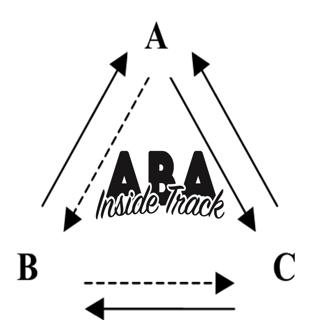
November 2020 Preview
Join us this November for a cornucopia of riches to give thanks to. At least, when it comes to awesome behavior analytic topics and guests. Between challenging behavior, necessary life skills, and human rights, we've got enough content to entertain you on Thanksgiving from the first dinner roll to the last slice of turkey. And, if your Zoom family gathering is going south, just put on ABA Inside Track on and pretend we're joining you for after-dinner pumpkin pie. Pie not included. Articles for November 2020 Elopement w/ Dr. Megan Boyle Boyle, M.A. & Adamson, R.M. (2017). Systematic review of functional analysis and treatment of elopement (2000-2015). Behavior Analysis in Practice, 10, 375-385. doi: 10.1007/s40617-017-0191-y Boyle, M.A., Keenan, G., Forck, K.L., & Curtis, K.S. (2019). Treatment of elopement without blocking with a child with autism. Behavior Modification, 43, 132-145. doi: 10.1177/0145445517740871 Boyle, M.A., Bacon, M.T., Brewer, E.M., Carton, S.M., & Gaskill, L.A. (2020). Evaluating a treatment wihtout extinction for elopement maintained by access to stereotypy. Journal of Applied Behavior Analysis, 53, 1531-1541. doi: 10.1002/jaba.682 Sexual Wellbeing w/ Worner Leland + Barb Gross Davis, T.N., Machalicke, W., Scalzo, R., Kobylecky, A., Campbell, V., Pinkelman, S., Chan, J.M., & Sigafoos, J. (2016). A review and treatment selection model for individuals with developmental disabilities who engage in inappropriate sexual behavior. Behavior Analysis in Practice, 9, 389-402. doi: 10.1007/s40617-015-0062-3 Stein, S. & Dillenburger, K. (2017). Ethics in sexual behavior assessment and support for people with intellectual disability. International Journal on Disability and Human Development, 16, 11-17. doi: 10.1515/ijdhd-2016-0023 Taylor, B. & Davis, S. (2007). The extended PLISSIT model for addressing the sexual wellbeing of individuals with an acquired disability of chronic illness. Sexuality and Disability, 25, 135-139. doi: 10.1007/s11195-007-9044-x Dental Exam Tolerance w/ Dr. Kelly McConnell Allen, K.D., & Wallace, D.P. (2013). Effectiveness of using noncontingent escape for general behavior management in a pediatric dental clinic. Journal of Applied Behavior Analysis, 46, 723-737. doi: 10.1002/jaba.82 Carter, L., Harper, J.M., & Luiselli, J.K. (2019). Dental desensitization for students with autism spectrum disorder through graduated exposure, reinforcement, and reinforcement fading. Journal of Developmental and Physical Disabilities, 31, 161-170. doi: 10.1007/s10882-018-9635-8 McConnell, K.L., Sassi, J.L., Carr, L., Szalwinski. J., Courtemanch, A., Njie-Jallow, F., & Cheney, W.R. (2020). Functional analysis and generalized treatment of disruptive behavior during dental exams. Journal of Applied Behavior Analysis. doi: 10.1002/jaba.747 Appukuttan, D.P. (2016). Strategies to manage patients with dental anxiety and dental phobia: Literature review. Clinical, Cosmetic and Investigational Dentistry, 8, 35-50. doi: 10.2147/CCIDE.S63626
4 Marras 202016min

Episode 145 - Self Care w/ Dr. Shane Spiker
If your list of self-care activities begins and ends at a big glass of wine, you may not be doing it right. And, as our special guest, Dr. Shane Spiker, shares, you're not alone. This week, we discuss the challenges of self-care for behavior analysts including the consequences of burnout and the surprising fact that taking care of ourselves is an actual learned skill. Articles discussed this episode: Gibson, J.A., Grey, I.M., & Hastings, R.P. (2009). Supervisor support as a predictor of burnout and therapeutic self-efficacy in therapists working in ABA schools. Journal of Autism and Developmental Disorders, 39, 1024-1030. doi: 10.1007/s10803-009-0709-4 Plantiveau, C., Dounavi, K., & Virues-Ortega, J. (2018). High level of burnout among early-career board-certified behavior analysts with low collegial support in the work environment. European Journal of Behavior Analysis, 19, 195-207. doi: 10.1080/15021149.2018.1438339 Dounavi, K., Fennell, B., & Early, E. (2019). Supervision for certification in the field of applied behaviour analysis: Characteristics and relationship with job satisfaction, burnout, work demands, and support. International Journal of Environmental Research and Public Health, 16, 2098. doi: 10.3390/ijerph16122098 If you're interested in ordering CEs for listening to this episode, click here to go to the store page. You'll need to enter your name, BCBA #, and the two episode secret code words to complete the purchase. Email us at abainsidetrack@gmail.com for further assistance.
28 Loka 20201h 8min

Episode 144 - Grab Bag Reboot
This Halloween, don't run away. Don't lock your doors. Don't hide under your bed. Because, the audio file is already in your ears. Grab Bag Reboot. This time, it's personal. Articles discussed this episode: Gunning, C., Holloway, J., & Grealish, L. (2020). An evaluation of parents as behavior change agents in the Preschool Life Skills program. Journal of Applied Behavior Analysis, 53, 889-917. doi: 10.1002/jaba.660 Luna, O. & Rapp, J.T. (2019). Using a checklist to increase objective session note writing: Preliminary results. Behavior Analysis Practice, 12, 622-626. doi: 10/1007/s40617-018-00315-4 Milata, E.M., Reeve, S.A., Reeve, K.F., & Dickson, C.A. (2020).. A blueprint for general-case procedures illustrated by teaching adolescents with autism spectrum disorder to use a chip-debit card. Behavioral Interventions, 35, 1-26. doi: 10.1002/bin.1719 If you're interested in ordering CEs for listening to this episode, click here to go to the store page. You'll need to enter your name, BCBA #, and the two episode secret code words to complete the purchase. Email us at abainsidetrack@gmail.com for further assistance.
21 Loka 20201h 4min

Episode 143 - Stimulus Equivalence
By popular demand (of Diana), we're talking all about stimulus equivalence. After drawing multiple pictures to remind ourselves of the inner workings of this powerful process, we dive into relevant research from three generations: a Sidman original, a go-go 90's extension, and a practical example of stimulus equivalence in special education. Articles discussed this episode: Sidman, M. Cresson, Jr., O., & Willson-Morris, M. (1974). Acquisition of matching to sample via mediated transfer. Journal of the Experimental Analysis of Behavior, 22, 261-273. doi: 10.1901/jeab.1974.22-261 Cowley, B.J., Green, G., & Braunling-McMorrow, D. (1992). Using stimulus equivalence procedures to teach name-face matching to adults with brain injuries. Journal of Applied Behavior Analysis, 25, 461-475. doi: 10.1901/jaba.1992.25-461 Keintz, K.S., Miguel, C.F., Kao, B., & Finn, H.E. (2011). Using conditional discrimination training to produce emergent relations between coins and their values in children with autism. Journal of Applied Behavior Analysis, 44, 909-913. doi: 10.1901/jaba.2011.44-909 If you're interested in ordering CEs for listening to this episode, click here to go to the store page. You'll need to enter your name, BCBA #, and the two episode secret code words to complete the purchase. Email us at abainsidetrack@gmail.com for further assistance.
14 Loka 20201h 14min

October 2020 Preview
No tricks this month on the show unless you're terrified of stimulus equivalence like Rob! For everyone else, it'll be all treats for your ears with the return of a popular (?) episode format as well as a cozy fall discussion about self-care with special guest, Dr. Shane Spiker. Snuggle up with some hot apple cider, a warm sweater, and a brand new delay tolerance flow chart. Articles for October 2020 Stimulus Equivalence Sidman, M. Cresson, Jr., O., & Willson-Morris, M. (1974). Acquisition of matching to sample via mediated transfer. Journal of the Experimental Analysis of Behavior, 22, 261-273. doi: 10.1901/jeab.1974.22-261 Cowley, B.J., Green, G., & Braunling-McMorrow, D. (1992). Using stimulus equivalence procedures to teach name-fce matching to adults with brain injuries. Journal of Applied Behavior Analysis, 25, 461-475. doi: 10.1901/jaba.1992.25-461 Keintz, K.S., Miguel, C.F., Kao, B., & Finn, H.E. (2011). Using conditional discrimination training to produce emergent relations between coins and their values in children with autism. Journal of Applied Behavior Analysis, 44, 909-913. doi: 10.1901/jaba.2011.44-909 Grab Bag Reboot Gunning, C., Holloway, J., & Grealish, L. (2020). An evaluation of parents as behavior change agents in the Preschool Life Skills program. Journal of Applied Behavior Analysis, 53, 889-917. doi: 10.1002/jaba.660 Luna, O. & Rapp, J.T. (2019). Using a checklist to increase objective session note writing: Preliminary results. Behavior Analysis Practice, 12, 622-626. doi: 10/1007/s40617-018-00315-4 Milata, E.M., Reeve, S.A., Reeve, K.F., & Dickson, C.A. (2020).. A blueprint for general-case procedures illustrated by teaching adolescents with autism spectrum disorder to use a chip-debit card. Behavioral Interventions, 35, 1-26. doi: 10.1002/bin.1719 Self-Care w/ Dr. Shane Spiker Gibson, J.A., Grey, I.M., & Hastings, R.P. (2009). Supervisor support as a predictor of burnout and therapeutic self-efficacy in therapists working in ABA schools. Journal of Autism and Developmental Disorders, 39, 1024-1030. doi: 10.1007/s10803-009-0709-4 Plantiveau, C., Dounavi, K., & Virues-Ortega, J. (2018). High level of burnout among early-career board-certified behavior analysts with low collegial support in the work environment. European Journal of Behavior Analysis, 19, 195-207. doi: 10.1080/15021149.2018.1438339 Dounavi, K., Fennell, B., & Early, E. (2019). Supervision for certification in the field of applied behaviour analysis: Characteristics and relationship with job satisfaction, burnout, work demands, and support. International Journal of Environmental Research and Public Health, 16, 2098. doi: 10.3390/ijerph16122098
7 Loka 202019min

Episode 142 - (SUPERVISION) Super Supervision!
Finally, rounding out our month-long Supervision September comes an episode all about how to be the superest supervisor that ever did supervise. Whether it's maximizing your supervision bandwidth or hyper-focusing your supervisee's experiences, we're checking out some new ideas to make supervision more fun than a barrel of monkeys. Articles discussed this episode: Garza, K.L., McGee, H.M., Schenk, Y.A., & Wiskirchen, R.R. (2018). Some tools for carrying out a proposed process for supervising experience hours for aspiring Board Certified Behavior Analysts. Behavior Analysis in Practice, 11, 62-70. doi: 10.1007/s40617-017-0186-8 Hartley, B.K., Courtney, W.T., Rosswurm, M., & LaMarca, V.J. (2016). The apprentice: An innovative approach to meet the Behavior Analysis Certification Board's supervision standards. Behavior Analysis in Practice, 9, 329-338. doi: 10.1007/s40617-016-0136-x If you're interested in ordering CEs for listening to this episode, click here to go to the store page. You'll need to enter your name, BCBA #, and the two episode secret code words to complete the purchase. Email us at abainsidetrack@gmail.com for further assistance.
30 Syys 20201h 10min

Episode 141 - Supervision Series IV - (SUPERVISION) Bringing Out the Best in People Book Club, pt. 2
This week we conclude our deep dive into "Bringing Out the Best in People" by discussing some of the more ephemeral components of supervision. For instance, did you know that you can supervise creativity? And what does the future hold for supervision now that Zoomers are entering the work force. All this and the history of Nintendo. Articles discussed this episode: Daniels, A.C. (2000). Bringing out the best in people (2nd ed.). McGraw-Hill, Inc If you're interested in ordering CEs for listening to this episode, click here to go to the store page. You'll need to enter your name, BCBA #, and the two episode secret code words to complete the purchase. Email us at abainsidetrack@gmail.com for further assistance.
23 Syys 20201h 13min

Episode 140 - Supervision Series IV - (SUPERVISION) Bringing Out the Best in People Book Club, pt. 1
Continuing with Supervision September, we delve deep into the science and generalization of supervisory skills with our newest book club series on "Bringing Out the Best in People", the classic management book by Aubrey Daniels. How are running Fortune 500 companies and ABA like peanut butter and chocolate? And what does positive reinforcement have to do with improving the widget production line? Listen in and join us for part 2 next week! Book discussed this episode: Daniels, A.C. (2000). Bringing out the best in people (2nd ed.). McGraw-Hill, Inc If you're interested in ordering CEs for listening to this episode, click here to go to the store page. You'll need to enter your name, BCBA #, and the two episode secret code words to complete the purchase. Email us at abainsidetrack@gmail.com for further assistance.
16 Syys 20201h 16min






















